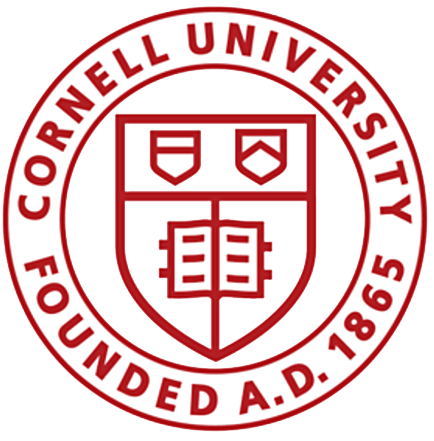
Our Team
Executive Leadership Council

I see plants as exceptional ‘engineers’. They control chemical and physical processes in elegant and unexpected ways and play dominant roles in defining the well-being of people and the planet. Plants also present understudied challenges that can inspire innovations and foster discoveries in engineering and the physical sciences. With CROPPS, I hope to learn from plants and plant scientists, to open new dialogues that will guide exciting developments in both the life sciences and engineering, and to empower future generations of digital biologists who will define sustainable and robust interactions between humans and plant systems.
Plant systems have captured my imagination since my doctoral work in the field of microfluidics. Walking through the Redwood National Forest in California, I looked up and thought: “How can it be? How could this massive organism overcome gravity to move water from the soil to its needles?” The thermodynamics and dynamics seemed impossible. When I set up my lab at Cornell, my first graduate student and I set out to “learn by building.” We created a primitive ‘synthetic tree’ that showed, for the first time, that the thermodynamics and dynamics of water movement in plants, though exotic, are feasible and engineerable. Since that breakthrough, I have sought and cultivated collaborations with plant scientists so that I could develop a tool to learn directly from plants. My lab designed a sensor that let me listen to plants and hear when they are under water stress. That was my first ‘CROPPS’ moment; my first experience of the thrill of communicating with plants!
Hearing from one plant was astonishing, but plants don’t exist as isolated individuals, they are in constant interaction with each other and their surrounding environment. To understand plant ‘engineering’ requires studying not only the complex details of individual plant functions but how they work together within the full complexity of a complete environment. This requires moving research out of the lab and into the world as it is. With CROPPS, I hope to bring engineers and plant scientists together to break down existing knowledge boundaries—between engineering and plant science but also between lab science and field science. Through these collaborations, CROPPS will provide a vibrant community in which researchers can transcend existing boundaries and understand plants not just as mute entities in isolated, controlled environments, but as gregarious, communicative participants in a dynamic interactive ecological system.
Research themes: Plant Systems, Plant Programming
Photo by Dave Burbank
By cultivating a community of researchers and educators from diverse backgrounds who develop technologies, inspire scientific discoveries, and effectively engage with the public, CROPPS envisions harnessing digital biology in ways that promote health and foster resilience in a changing climate. My project contributes to CROPPS social science research on Social and Ethical Engagement in Digital Biology (SEED). The project investigates key stakeholder views on social and ethical aspects of digital biology, including perceptions about emerging technologies and issues surrounding equity. Project findings will support and inform the CROPPS research process and encourage fruitful engagement with the public by broadening understanding of stakeholder perspectives.
Research Theme: Social and Ethical Engagement
Photo by Brian L. Stauffer
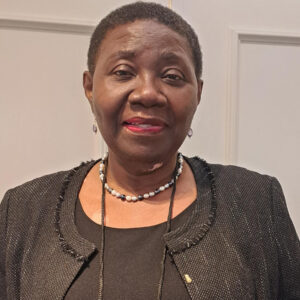
I am professor of Molecular Genetics and Biotechnology at Tuskegee University with over three decades of experience in plant biotechnology and omics research. I am deeply involved in training and outreach initiatives aimed at underserved communities, farmers, and the people of Sub-Saharan Africa.
My research centers around plant bioengineering and genetic engineering, focusing on areas such as plant development, tissue culture, somatic embryogenesis regeneration, agricultural molecular genetics, and CRISPR gene editing. Some of my notable research include genome structure/sequencing of disease resistant motifs, development of high protein sweetpotato lines, establishment of the plasmid-based and RNP-based CRISPR/Cas9 system in sweetpotato, efficient editing of sweetpotato ibPDS, and ibeIF(iso)4E Family. This work and many more have been presented at national and international conferences, and published in peer review journals. One of my key interests lies in the discovery and utilization of developmental and morphogenic genes in storage root development, as well as the expression of value traits and bio-active products in transgenic plants.
In addition to my research endeavors, I am deeply committed to education. I teach courses on plant genetics & breeding and biotechnology, and I have established the acclaimed Innovative Plant Breeding Experiential Education & Training initiative for Minority undergraduates (iBREED). Furthermore, I serve as a Board member of the Council of Agriculture Science and Technologies (CAST) and Plant Breeding Coordination Committee (PBCC).
My involvement in initiatives like CROPPS at Cornell University aims to address disparities in access to training and research experience, particularly for underserved communities. Through my work, I strive to contribute to the advancement of agricultural science and the empowerment of diverse voices in the field.
In the Frank lab, we are interested in how plants communicate both locally (between groups of cells) and over long distances (between root and shoot systems). We are developing new approaches to block, deliver, and image mobile signals; to rewire natural/native communication systems to enable new conversations between plants, people, and their environment; and to track existing conversations within plants using high-throughput sequencing and computational approaches. By learning more about the language of plants we hope to eventually participate in this biocommunication. As the co-lead for the Plant Communication (iTOC) group, and an active participant in CROPPS, I am excited to be working in this highly collaborative space where we are exploring new routes to “listen” and “speak” to plants.
Research Theme: Plant Communications
For CROPPS, we will work with programmable plants and the Internet of Living Things (IoLT) at the population level to reveal a novel range of tunable phenotypes. When quantified across hundreds to thousands of distinct genetic backgrounds, this will produce a phenotypic landscape with extensive plasticity, expanding the adaptive potential of the population. As a plant breeder, I will then use this information to select plant genotypes that have the most favorable combinations of phenotypes for target environments. This will result in more resilient plants and increased yields. This strategy could be useful for a variety of plant breeding programs, large and small. As a co-lead of the Discovery Engine for Extreme Phenotypes and Field Investigation of Novel Diversity (DEEPFIND) research thrust, I hope to make this vision a reality through interdisciplinary research that ultimately generates extreme, selectable phenotypic variation that can be modeled to help enhance genetic gains in plant breeding programs.
Research Theme: Plant Systems

At CROPPS, we are pioneering the next generation of digitized molecular breeding, enabling plants to communicate their water, nitrogen, and defense needs to farmers, digital field systems, and the microbiome. We aim to foster collaboration with farmers, industry leaders, and the public to shape the future of innovative and sustainable agriculture.
I bring to CROPPS a unique blend of industry and academic experience leading cross-functional, global teams. As part of CROPPS’ Team Science, I am dedicated to empowering the next generation of scientists to push boundaries, collaborative across disciplines, and drive breakthroughs in programmable plants and digital agriculture.

As a computer engineer, I am always excited by complex problems, because complexity often requires computers to find effective solutions! With CROPPS, I seek to use my expertise by imagining hardware-software approaches that enable high-performance plant data collection and computation in the farm and the cloud.
In the last few years, work in my field has shifted away from a decades-long interest in general-purpose computers to developing more specialized programmable hardware optimized for specific domains. Within CROPPS, I believe at least two contexts are ripe for such domain-specific computers. One of these two contexts is systems that can efficiently collect, analyze, and act upon data from sensors distributed through a farm. For example, data from various sensors may suggest that crops could be under water stress, which a cloud-based algorithm may decide to act upon, producing an irrigation schedule that mitigates the problem while minimizing water waste and energy consumption. The other context more intimately involves a plant’s genetic make-up, literally transforming it into a living sensor that can tell us about its condition and that of its surrounding environment through phenotypic expression—a change in leaf translucence or pigmentation, for example. Figuring out exactly how to “program” the plant’s genome to communicate in that way requires significant computational power. These two contexts combined create a true “Internet of Living Things.”
My other role in CROPPS is as Associate Director for Institutional Engagement. By emphasizing continuous engagement with and mentorship of CROPPS students, postdoctoral fellows, and faculty alike, we seek to nurture members from a wide variety of backgrounds and lived experiences. Ultimately, we aspire to create a new generation of scientists and leaders that will become agents of change during and after their CROPPS tenure.
Research themes: Plant Systems, Public Engagement
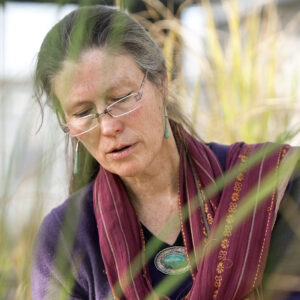
I have always been interested in language and the ways it allows us to share ideas, perceptions, and experiences beyond the boundaries of individual reality. As a plant scientist and breeder, I’m excited to join the CROPPS team of biologists, engineers, and computer and information scientists as we seek to create a two-way communication system with plants.
Plants are responsive, living organisms that use complex forms of communication to explore and respond to the world in which they live. Their ‘language’ is mediated by chemical, optical and electrical signaling systems that challenge human understanding. Plants use these systems to exchange information with other members of their community – other plants, insects, and the diverse array of organisms in their microbiomes.
As organisms, plants lie at the base of the world’s food chain and feed all life. They also play a dominant role in defining our climate’s future. Their survival is our survival, and yet, our current interactions and communications with plant systems are primitive. We lack the tools to probe the deep biological processes that mediate how they organize, process, record, and share information; how they respond to environmental stimuli; and how they select from a range of possible responses. We know plants communicate readily with other organisms, but they use a language that is strange and unfamiliar to human beings.
CROPPS researchers will invent new technologies and foster scientific discoveries to develop new communication tools (living nodes on the Internet of Living Things). These tools will allow us to capture, transmit, integrate, and understand plant signals; to make discoveries and predictions; and to send return signals in response. If we can establish a two-way dialogue with living plant systems, we can gain insight into real-time biological processes in ways never before possible. That insight, driven by deep respect for the living world, has profound implications for reshaping human responses to climate change, environmental degradation, and global hunger.
Research themes: Plant Communications
Photo by Robert Barker
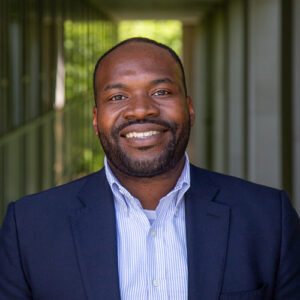
My background and experiences continue to contribute to the Center’s success. Prior to joining CROPPS, I served as Assistant Director at the University at Buffalo Honors College for three years. During my time at UB Honors College, I created programming and initiatives that were directly responsible for rapidly increasing the student population. I also held positions in K-12 education and STEM organizations, including serving as an instructor for robotics and additive manufacturing.
I graduated from Johnson C. Smith University, a historically black college, with a bachelor’s degree in computer engineering and international business; along with a Masters degree in Chinese Education from the University at Buffalo. I live in Buffalo, New York with my wife and two sons. I have lived in several cities, including Beijing, China for 2 years, where I studied and became fluent in Mandarin Chinese.

As Executive Director of the Center for Digital Agriculture at the University of Illinois, I have the privilege of leading an innovative team at the forefront of agricultural technology. My role as the Illinois campus lead for CROPPS further amplifies my commitment to pioneering sustainable and efficient agricultural practices. Additionally, my position as a Research Professor in Computer Science, Agricultural and Biological Engineering, and Electrical and Computer Engineering allows me to blend theoretical knowledge with practical applications, a synergy that fuels my passion for advancing the agricultural sector.
My career spans over 35 years of technology leadership in both industry and academia, marked by a dedication to innovation and excellence. From 1986 to 2000, I served on the faculty at the University of Illinois, where my research focused on the sensing, automation, and control of agricultural systems, including crops, plants, food, and more. This period laid the foundation for my lifelong commitment to enhancing the efficiency and sustainability of agriculture through technology.
In 2001, I embarked on a transformative journey with Deere and Company, where I spearheaded the development of enterprise field robotics capabilities. My tenure at Deere was characterized by my role in innovation management, particularly as Director, Enterprise Product Innovation and Technology, which I led for 14 years. My efforts were recognized in 2017 when I was honored as a John Deere Technical Fellow for my contributions to Technology Innovation, a milestone that reflects my dedication to pushing the boundaries of what’s possible in agricultural technology.
My election to the National Academy of Engineering in 2019 stands as one of my proudest achievements, acknowledging my contributions to automation in agriculture. This accolade not only represents the culmination of years of hard work and dedication but also reaffirms my commitment to advancing agricultural practices through innovation and technology.

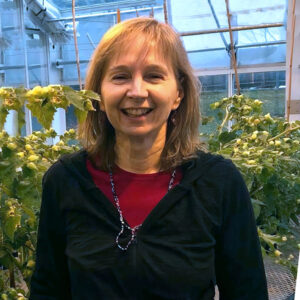
I work with CROPPS aligns with her interest in understanding gene function to improve crops for sustainable food security. With CROPPS, I will work to develop a two-way interaction with plants that will enable us to understand and to respond to their signals. If we can understand what plants need, when they need it, we can produce healthier plants with improved yields and greater resilience to climate and environmental stresses, and we can do so with fewer, more well-managed resources.
I will be working to develop a high-throughput pipeline for generating different iterations of comprehensible, programmable plants for testing in lab and field. This will also require pushing plant genetic engineering beyond its current limits, enabling it to meet the high demand for this technology, which is essential for plant research of all kinds, in all locations. Collaboration within CROPPS, which includes engineers and computer scientists as well as plant researchers, will foster the development of more efficient plant genetic engineering methods. These new methods will not only support this particular project but will advance innovation and research in agriculture across the world.
Research theme: Plant Programming

With CROPPS, I am excited to use my expertise in computer systems and networking to open a dialogue with plants. The goal is a two-way conversation—to understand the ongoing communications between plants but also to join their conversation. Current engineering and plant science research projects have used external sensors which measure conditions like water or nutrient levels in plants and then transmit a message when the plant is in stress. I am interested in developing a system where the plant itself is a sensor, directly transmitting through a network to computers which serve as the conduit to carry the communications to people, an Internet of Living Things (IoLT). For me, CROPPS is the creation of a synergy between computers, plants, and people, to help grow plants better.
Much of my prior work has involved making networks faster and computers more reliable, often for big companies; my work with CROPPS will allow me to put my expertise to work for plants, farms, and growers. To do this will require figuring out how to instrument a farm (even one without cellular access) in a way that allows high-bandwidth communication that can receive and respond to simultaneous transmissions from numbers of plants. We are currently experimenting with using analog signals (tv antennas) to create robust local networks regardless of cellular availability. We are also engaging with the challenges of developing systems that must function seamlessly and autonomously throughout a growing season in often remote areas.
Developing this new system of communicating with plants and people at scale will have effects far beyond the simple addition of technologies to individual farms. If the farm becomes networked, how does that change what a farm is? Will we have to transform our understanding of what a ‘farmer’ is, broadening it to include technologists and data analysts? I am working with social scientists to ensure the process is transparent and proactive, so that we can plan for and optimize these social transformations and build flexibility into the system. Designing the ‘perfect’ farm network is unrealistic; the farm user needs the ability and independence to make changes. Transparency in planning will also involve ensuring that new technologies, procedures, and knowledge will be freely and broadly accessible. In my role as Associate Director for Innovation and Partnerships, I will foster a level playing field, where the open exchange of ideas can thrive among all stakeholders (including individuals, NGOs, non-profits, and corporations), at all stages of the process (from producers to consumers), and for a diversity of groups.
Research themes: Plant Programming, Public Engagement
My lab group is interested in understanding how plants sense and respond to their environment so that we can create genetic circuits that can control plant health and growth and can let us know what a plant is “thinking” and what it needs to grow at its highest potential. Our first goal will be to create circuits controlled by light (optogenetic switches and circuits), which will allow us non-invasively to control and monitor plants without chemicals. These technologies will be crucial to efforts to develop new plant varieties that can thrive in dynamic, stressful environments.
Research Theme: Plant Communications
Research Leads
By cultivating a community of researchers and educators from diverse backgrounds who develop technologies, inspire scientific discoveries, and effectively engage with the public, CROPPS envisions harnessing digital biology in ways that promote health and foster resilience in a changing climate. My project contributes to CROPPS social science research on Social and Ethical Engagement in Digital Biology (SEED). The project investigates key stakeholder views on social and ethical aspects of digital biology, including perceptions about emerging technologies and issues surrounding equity. Project findings will support and inform the CROPPS research process and encourage fruitful engagement with the public by broadening understanding of stakeholder perspectives.
Research Theme: Social and Ethical Engagement
Photo by Brian L. Stauffer
In the Frank lab, we are interested in how plants communicate both locally (between groups of cells) and over long distances (between root and shoot systems). We are developing new approaches to block, deliver, and image mobile signals; to rewire natural/native communication systems to enable new conversations between plants, people, and their environment; and to track existing conversations within plants using high-throughput sequencing and computational approaches. By learning more about the language of plants we hope to eventually participate in this biocommunication. As the co-lead for the Plant Communication (iTOC) group, and an active participant in CROPPS, I am excited to be working in this highly collaborative space where we are exploring new routes to “listen” and “speak” to plants.
Research Theme: Plant Communications
For CROPPS, we will work with programmable plants and the Internet of Living Things (IoLT) at the population level to reveal a novel range of tunable phenotypes. When quantified across hundreds to thousands of distinct genetic backgrounds, this will produce a phenotypic landscape with extensive plasticity, expanding the adaptive potential of the population. As a plant breeder, I will then use this information to select plant genotypes that have the most favorable combinations of phenotypes for target environments. This will result in more resilient plants and increased yields. This strategy could be useful for a variety of plant breeding programs, large and small. As a co-lead of the Discovery Engine for Extreme Phenotypes and Field Investigation of Novel Diversity (DEEPFIND) research thrust, I hope to make this vision a reality through interdisciplinary research that ultimately generates extreme, selectable phenotypic variation that can be modeled to help enhance genetic gains in plant breeding programs.
Research Theme: Crop Systems
I am interested in developing open-source software tools for scientific research, particularly in the realm of computational modeling across wide ranges of spatial and temporal scales. By connecting biological models across scales, scientists can gain a deeper understanding of the dynamic processes that connect crop genetics, crop growth, and the larger environments in which crops grow. This understanding will be instrumental in charting a path forward for global food production under climate change. As a part of CROPPS, I look forward to collaborating with biologists, engineers, and computer scientists. Such cross-pollination between disciplines will allow us to tackle new modeling challenges and develop the software tools necessary to use real-time feedback from crops to determine how to give crops what they need to thrive.
Research Theme: Automation and Sensing
I am a research lead for the robotic autonomy thrust within IMPACT. My role is to identify automation needs within CROPPS and to define new visions for autonomous robots to aid in phenotyping and endophenotyping at all stages of crop growth. I am a transdisciplinary researcher between material science and robotics and have focused my efforts on the field of Soft Robotics. While this research focus does not define my CROPPS efforts, I do have several projects related to implementing soft robotics in plant science. I consider myself a full stack roboticist, from synthesis of materials, to design of mechanisms and sensors, and to implementation of algorithms for their autonomous control. Having grown up in Central Illinois and attended the University of Illinois, Urbana-Champaign, I am very excited about the opportunity to bring together Cornell University, the University of Illinois, and the University of Arizona in this effort to automate discovery in crop science.
Research Theme: Automation and Sensing
I lead a team of researchers interested in improving our understanding of how plants use water and make energy through photosynthesis. By tuning the plant responses to the environment and engineering novel circuits we hope to optimize plant growth and development. We also aim to design reporter systems that will provide a clear, real-time signal of the plant’s health. CROPPS offers a unique opportunity to for collaboration between several biological disciplines, engineering, and computer science. Together, we will address complicated questions in agriculture and design efficient crops that can meet the demand for sustainable food production in a changing climate. As DEEPFIND co-lead, I will foster collaboration between these groups, allowing us to address deep biological questions that can only be deciphered through interdisciplinary team science.
Research Theme: Crop Systems

I work with CROPPS aligns with her interest in understanding gene function to improve crops for sustainable food security. With CROPPS, I will work to develop a two-way interaction with plants that will enable us to understand and to respond to their signals. If we can understand what plants need, when they need it, we can produce healthier plants with improved yields and greater resilience to climate and environmental stresses, and we can do so with fewer, more well-managed resources.
I will be working to develop a high-throughput pipeline for generating different iterations of comprehensible, programmable plants for testing in lab and field. This will also require pushing plant genetic engineering beyond its current limits, enabling it to meet the high demand for this technology, which is essential for plant research of all kinds, in all locations. Collaboration within CROPPS, which includes engineers and computer scientists as well as plant researchers, will foster the development of more efficient plant genetic engineering methods. These new methods will not only support this particular project but will advance innovation and research in agriculture across the world.
Research theme: Plant Bioengineering and SynBio
My lab group is interested in understanding how plants sense and respond to their environment so that we can create genetic circuits that can control plant health and growth and can let us know what a plant is “thinking” and what it needs to grow at its highest potential. Our first goal will be to create circuits controlled by light (optogenetic switches and circuits), which will allow us non-invasively to control and monitor plants without chemicals. These technologies will be crucial to efforts to develop new plant varieties that can thrive in dynamic, stressful environments.
Research Theme: Plant Communications
Senior Personnel
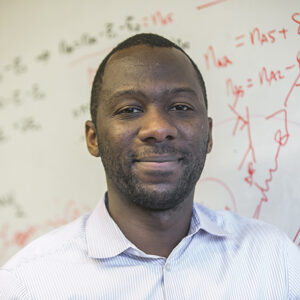
I am interested in CROPPS because it presents an opportunity to engineer plants and their associated organisms for a sustainable global climate and human well-being. I will leverage my research on biomacromolecule design and nano-technology to overcome a significant bottleneck in plant transformation by providing new chemical tools for genetic manipulation of plants. Current methods for achieving plant transformation include Agrobacterium-mediated delivery, plant viral vectors, and biolistic particle delivery; each has significant limitations. Recently, non-viral vectors have shown promise for passive transport of genetic material into stems, leaves, roots and seeds. My lab uses tools in synthetic chemistry, biomolecular engineering, and chemical biology to engineer functional biomolecular and nanoparticle therapeutics for humans. By assembling sequence-defined biomacromolecules, my lab has created stimuli-responsive biomaterials, nano-based drug delivery bioconjugates, potent antivirals and antimicrobial agents. We will harness this expertise to evaluate different classes and compositions of hard and soft nanomaterials for efficient, non-viral gene delivery into plant cells.
Plant roots are the drivers of water uptake and the acquisition of nutrients from the soil. While farmers have long realized the critical connection between the soil and plant productivity, researchers have only recently begun to acknowledge the importance of better understanding shifts in root-soil interactions in response to the environment. My work with CROPPS will incorporate synthetic roots, in-soil water imaging technologies, and subterranean robots to research root response to localized water, root exudates, and microbial communities and how these parameters affect whole plant physiology. This basic research could enable strategies to minimize the consequences of environmental stresses (such as the interaction of a limited water supply on root function or fine-root responses to associated microbial communities) and open new opportunities to increase plant productivity and ensure sustainable food supplies.
The Beilstein Lab studies plants in the family Brassicaceae, which includes many agriculturally important vegetable crops, such as broccoli, cauliflower, canola oil, and radish. Using a variety of species in the family, we work to understand how evolution shapes important traits that influence the ability of plants to reproduce effectively. For CROPPS, we are currently investigating the signals that are exchanged between pollen and receptive maternal plants. Our goal is to engineer signals that will allow us to manipulate the interaction between pollen, the maternal plant, and her egg cells. Ultimately we hope to engineer specific pollen and egg interactions that will allow us to control fertilization to increase yield by locking in beneficial traits in offspring.
Research Theme: Integrative Team for Organismal Communication (iTOC)
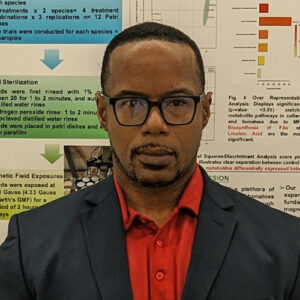
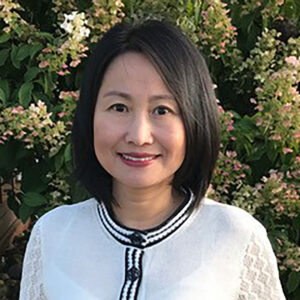
In the Gu Environmental Biotechnology Lab, we are interested in extending and integrating single-cell phenotyping into rhizomicrobiome research, with the aim to again a better understanding of plant-microbe-environment communications/interactions and improving plant health and productivity. We are developing a new Single cell Raman spectroscopy-based technology platform and its integrations with other analytical techniques (Raman-activated cell sorting, Stable Isotope Probing (SIP), Fluorescence in-situ hybridization (FISH) etc.), as well as advanced data analytics, to allow unprecedented exploration of complex microbial communities with improved specificity, sensitivity, and resolution. This will enable determinative link between genotype to phenotype of a microbe at single cell level without cultivation and, help fill the persistent gap in our ability to phenotype microbes (mostly unculturable) that make up the complex rhizosphere microbiome. As the co-lead for the Plant communications (iTOC) group, I am excited to collaborate with the CROPPs team to advance our ability to deduce genotype-to-phenotype connections and explore the correlations among under-ground plant, rhizomicrobiome, and above-ground plan canopy traits towards predictive and programmable plant systems.
Research Theme: Integrative Team for Organismal Communication (iTOC)

I do research in high performance computing for computational sciences and am interested in narrowing the gap between performance scalability and efficiency and computational sciences. Prior to my PhD in computer science, I studied biomedical sciences. The need for computational power in solving grand biological challenges is exactly what led me to shift my professional focus from pure life sciences to computer science and, in particular, high-performance computing and systems. I am very excited to be part of the CROPPS community and to apply my competencies in high performance computing and systems to create a dialog with plants through a deeper understanding of plant genomes, their expression and dynamics.
Research Theme: Integrative Team for Organismal Communication (iTOC)

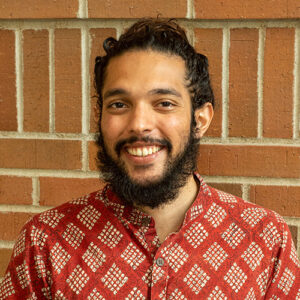
I am a bioengineer by training, having received my B.Sc. from Johns Hopkins and Ph.D. from the University of Washington. I have been working on plant synthetic biology across academia and industry since 2013. In 2022 I established my research group in the Biology department at Colorado State University. My group’s work spans plants, bacteria, fungi, and viruses and seeks to apply synthetic biology principles to study and re-engineer their biology to enhance sustainability, productivity, and resilience. I am passionate about fighting global hunger and malnutrition, and so I am excited about collaborating with the members of the CROPPS center to translate the tools and insights my program is generating into more productive and resilient crops.
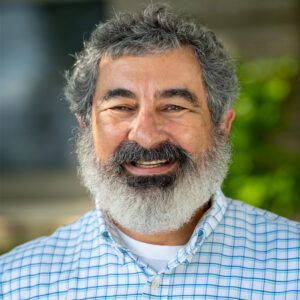
My goal with CROPPS is to improve the process of public engagement with science. I want to find ways to help scientists understand public interests and concerns early in the research process, so they can be addressed as research projects develop. This goes hand-in-hand with helping various publics understand what CROPPS is and can do.
Over the last 50 years, it’s become clear that public engagement isn’t just about “outreach” or “science literacy.” For public engagement to work, it must be a truly engaged conversation, where all parties – scientists, consumers, community members, business partners, and any other groups who care – listen to each other. Yes, publics need to understand the scientific process and the results of scientific work. But scientists must understand public interests and concerns, the values that shape responses to research, the ways that different groups understand and assess risk, and the place that science has in the lives of different communities. Just as we hope that scientific research will yield a better world, so we hope that public interests can lead to better science. “Politics” in the broadest sense, the sense of finding ways of addressing multiple interests through informed conversation, is a fundamental part of science.
To foster this kind of public engagement will require discovering what the social, ethical, and public engagement issues are in digital biology and programmable plants and then building capacity for real public engagement. I’ll work with CROPPS participants to understand their visions of what can be accomplished and then engage with various publics to understand their visions of what should be accomplished. Those public visions will feed back into CROPPS discussions, which in turn will shape future public activities in an ongoing process of engagement.
Research Theme: Social and Ethical Engagement
The Li lab develops synthetic biology tools, methods, and genetic parts for high-throughput construction and validation of complicated pathways and genetic circuits. We also combine synthetic biology approaches with multi-omics analyses including genomics, transcriptomics, proteomics, and metabolomics to understand plant specialized metabolism related to plant defense and/or plant communication. At CROPPS, we will work with plant biologists to apply our experience in genetic circuits development to plants for programmable, real-time plant monitoring and engineering. We will also combine domain knowledge and expertise in metabolomics, plant science, environmental science, and mechanical engineering to study a plant’s interactions with its environment.

I am an associate professor in the Department of Plant Biology at the University of Illinois, Urbana-Champaign. I use a systems biology approach to study regulatory mechanisms controlling plant response to the environment, with special focus on nitrogen signaling. I seek to improve crop productivity using multiscale modeling to predict gene to phenotype relationships and direct bioengineering efforts. My focus areas include: i) cross-communication among signaling pathways; and ii) integrative and multiscale modeling to analyze gene-by-environment interactions. I am excited to participate in CROPPS because it provides an opportunity to collaborate across domains to better understand how plant genotype translates to observed molecular phenotypes and traits.
Research themes: Plant Systems, Plant Programming

Imagine looking at a garden in early summer and wondering whether the plants are happy, and if not, how to cheer them up. Understanding when young plants begin to feel thirsty or hungry would make it easier to provide them water or nutrients for better growth. This enhanced communication with plants is an exciting potential outcome for CROPPS.
CROPPS is a personal lifelong dream come true. I spent my early years on a farm, and like most farmers I often wondered how the plants in our garden and fields were feeling. That curiosity has fueled my professional interest in research and education in crop biotechnology, with an emphasis on improving nutritional quality and environmental sustainability. Consistent with the interdisciplinary nature of CROPPS, my team uses approaches that integrate biology, engineering, and computing. The researchers in CROPPS envision plant “programs” operating as living nodes within a network of engineered communications systems. Through these systems, scientists, farmers, and eventually the casual gardener could listen to plants and help them with “stress-management”.
Knowledge of DNA sequences that already participate in environmental sensing and response are essential to building programmable plant systems. Recent discoveries across the CROPPS team indicate promising candidates for plant “circuits” that signal water and nitrogen status. Our group will attempt to install and optimize these circuits in corn. Importantly, we are not aiming to alter specific traits by the historical “one gene many acres” approach. Instead, CROPPS will use biotechnology to enhance our ability to “tune in” to plants and their local environments. This improved understanding of native plant processes will increase the resiliency of plants to future environmental challenges.
Research theme: Plant Programming
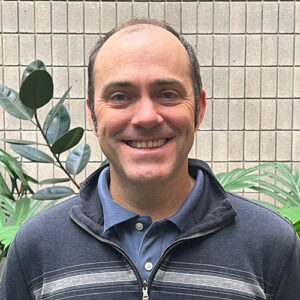
The Nelson lab uses comparative genomic, bioinformatic, and molecular approaches to better understand how plants regulate their stress responses at the RNA level and the degree to which these responses are conserved. For the purposes of CROPPS, we are focusing on an emerging field in transcriptomics, conserved placement in co-expression networks between species, and using this information to pinpoint ideal regulatory nodes that maximize plant response and minimize off-target effects. We are particularly excited to participate in CROPPS in order to determine how we can program these regulatory mechanisms in ways that are advantageous to crop growth, architecture, and yield.
My research focus within CROPPS is understanding the dynamics of how plants regulate their water balance under drought conditions. We are seeking to unravel the intricate balance between soil water potential, plant hydration status, and atmospheric demand in order to reveal the physiogenetic mechanisms responsible for the coordination and regulation of water potential in plant tissues. By enabling key technologies, CROPPS hopes to facilitate this type of research so that we may better understand these phenomena and breed new plant varieties for the climatic conditions of tomorrow, today.
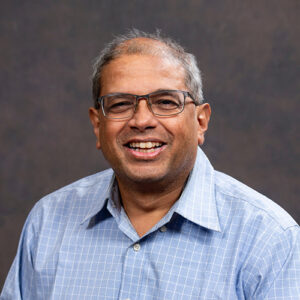
The Palanivelu Lab is interested in studying how plant cells communicate with each other and the environment. We are using pollen tube interactions with pistils during Arabidopsis and tomato reproduction as model systems to understand the molecular mechanisms that underlie these interactions. Currently, we are using the knowledge gained from this basic research to: i) overcome reproductive hybridization barriers in Brassicaceae model plants so that we can generate tools to break species barrier and generate novel hybrids and ii) develop new tomato varieties that are high yielding even under heat stress. For CROPPS, we are investigating if exogenously applied synthetic RALF peptides can initiate a synthetic ROS signaling wave. If successful, this programmable tool can be utilized by the CROPPS center to investigate and initiate the systemic signals responsible for enhancing plant stress tolerance and water use efficiency.
Research Theme: Integrative Team for Organismal Communication (iTOC)


I study artificial intelligence (AI) and information theory (the mathematical theory of communication). It would be so exciting if we could decode plant communication using information-theoretic and AI techniques, and then design signals that could communicate back. I’m also quite interested in public policy in the age of AI, especially in the context of securing the food system.
Research and Administration Management
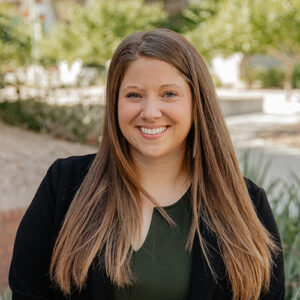



At CROPPS, we are pioneering the next generation of digitized molecular breeding, enabling plants to communicate their water, nitrogen, and defense needs to farmers, digital field systems, and the microbiome. We aim to foster collaboration with farmers, industry leaders, and the public to shape the future of innovative and sustainable agriculture.
I bring to CROPPS a unique blend of industry and academic experience leading cross-functional, global teams. As part of CROPPS’ Team Science, I am dedicated to empowering the next generation of scientists to push boundaries, collaborative across disciplines, and drive breakthroughs in programmable plants and digital agriculture.

My background and experiences continue to contribute to the Center’s success. Prior to joining CROPPS, I served as Assistant Director at the University at Buffalo Honors College for three years. During my time at UB Honors College, I created programming and initiatives that were directly responsible for rapidly increasing the student population. I also held positions in K-12 education and STEM organizations, including serving as an instructor for robotics and additive manufacturing.
I graduated from Johnson C. Smith University, a historically black college, with a bachelor’s degree in computer engineering and international business; along with a Masters degree in Chinese Education from the University at Buffalo. I live in Buffalo, New York with my wife and two sons. I have lived in several cities, including Beijing, China for 2 years, where I studied and became fluent in Mandarin Chinese.


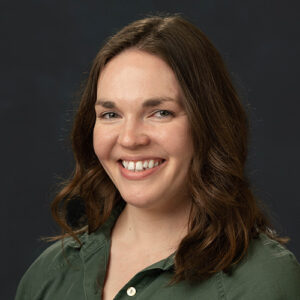
I am excited about work that empowers young adults to explore career possibilities in science, with the aim of inspiring the next generation of scientists. I collaborate with Delanie Sickler to administer and manage the CROPPS REU (Research Experience for Undergraduates) program. This initiative brings undergraduate students from various parts of the country to Cornell for a 10-week research experience within CROPPS.
I am an Ithaca native and with a degree in International Agriculture and Rural Development from Cornell University. Previously, I spent 10 years working for non-profit organizations in Iowa, New York City, and upstate New York as an agriculture educator doing hands-on direct education with K-12 students exploring topics related to agriculture, gardening, and their food systems. Ask me about the time I brought a cow into a 4th-floor elementary classroom!
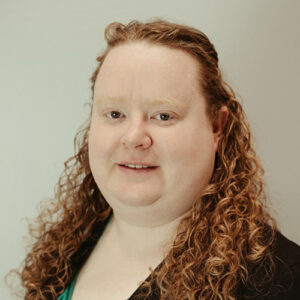
I am originally from Central Ky where I grew up on a beef and tobacco farm with a B.S. and M.S. degrees coming from the University of Kentucky. I graduated with her Ph.D. in Ag & Biological Engineering in Dec 2020, emphasizing livestock housing and animal welfare. In my free time, I enjoy working with my backyard chickens and cooking for others.
Trainees


As an early-career scientist, my biological emphasis has been genomic variations from a population scale to species across taxon, and the role of genomic variation in the evolution of plants and their traits. As plants in nature acutely respond and evolutionarily adapt to their environment, the genomic variations paint a picture of the diverse and plastid plant structure, physiology and molecular makeup.
Within CROPPS, my plan of action is to leverage publicly available, open-source genomic resources to mine molecular pathways of plants when exposed to environmental stressors such as nitrogen and drought stress. This work aligns with CROPPS’s ongoing mission to create stress-indicator plants. These data sets and analysis can be further leveraged as a tool to the greater CROPPS community by mining pathways of interest.
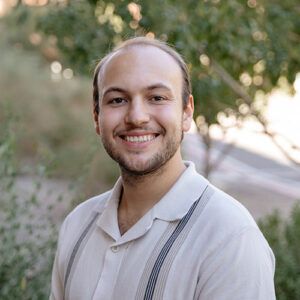
I am excited to be a part of CROPPS, which unites interdisciplinary research teams and provides an opportunity to contribute to plant engineering. Our team focuses on development of automated systems with novel detection mechanisms that could enhance the efficiency and productivity of plant transformation. I am working on the design and synthesis of micro-gel based pH-probes that will enable us to detect chemical signals during plant transformation. My goal is to develop a hydrogels systems suitable for a robotic fluid handling scheme, as an alternative to the agar media presently used.
Research Theme: Plant Bioengineering Hub (PBH)
CROPPS provides a unique platform for collaboration with researchers of varying disciplines, creating the opportunity to address questions from an interdisciplinary perspective. Developing rhizosphere-plant-human communication networks, a key concept in CROPPS, aligns with my research questions. I seek to understand microbial interactions that control phosphorus (P) bioavailability in the rhizosphere, with a specific focus on polyphosphate accumulating organisms (PAOs). Initially discovered in wastewater treatment processes, recent research has confirmed the presence of bacterial PAOs in rhizosphere systems. Their function and role in limiting or supplying bioavailable P in crop rhizospheres is currently unknown. I am studying the role of PAOs in below ground P storage and release with the hope of using this phenotypic function to engineer rhizosphere systems to be more nutrient efficient and resilient. By monitoring changes in P bioavailability, understanding functional roles of microbial systems in limiting this bioavailability, and subsequently utilizing microbial phenotypes to enhance P efficiency directly, we can work toward a rhizosphere-plant-human communication network that will facilitate addressing rising issues of P perturbations globally.
Research Theme: Integrative Team for Organismal Communication (iTOC)

Spending their lives rooted in one place, plants exhibit remarkable adaptability in their metabolism and development in response to the changing environment. Plants coordinate these stress responses by sending signals throughout their tissues, from roots to canopy and from one leaf to all others. Despite significant work in this area over the past century, fundamental questions remain about the modes by which signals propagate over long distances in plants. My collaborative and interdisciplinary research within CROPPS focuses on building mathematical models and developing experimental tools to study these long-distance signals, with the ultimate goal of generating knowledge for developing sentinel plants.
Research Themes: Integrative Team for Organismal Communication (iTOC)

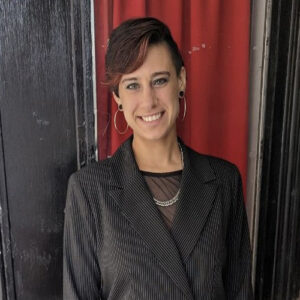
My work falls under the branch of CROPPS titled Social and Ethical Engagement in Digital Biology (SEED), which focuses on engaging stakeholders and the public in the research process in order to identify and address the social and ethical issues that develop alongside the new field of digital biology. My project uses the methods of social science to study the opportunities and challenges surrounding equity in the context of emerging technologies. Its initial focus is on understanding stakeholder perspectives.
Research Theme: Social and Ethical Engagement in Digital Biology (SEED)

My research contributes to the Social and Ethical Engagement in Digital Biology (SEED) theme. Responsibly researching and developing new agricultural technologies, like programmable plant sciences, requires building a meaningful societal dialogue. In particular, I am interested in public engagement activities whose goals are not necessarily to bring public views closer to scientists, but to explore the social issues that underrepresented audiences are considering. Being a part of the CROPPS team provides me great opportunities for interdisciplinary collaboration and to work alongside incredible scholars. I am grateful for CROPPS for supporting my work, demonstrating their commitment to fostering meaningful impacts in agriculture by investing in both the social sciences and the hard sciences.
Research Theme: Social and Ethical Engagement with Digital Biology (SEED)
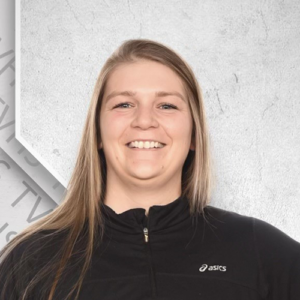
My research focus is on combining cutting-edge technologies with quantitative genetics approaches to generate high-dimensional data sets that elucidate the genetic architecture of complex traits in plants. Specifically, I am seeking to understand how plants regulate water potential in response to extreme climatic conditions including heat and drought stress. My current research project uses high-throughput phenotyping platforms, particularly Unoccupied Aerial Vehicles (UAVs), to monitor differences in plant water status on a diversity panel of approximately 350 different genotypes of cotton. By assessing differences in fiber quality of cotton grown under different irrigation regimes and analyzing the various physiological mechanisms that make a particular genotype more tolerant to an arid environment, this research identifies genetic variations useful in crop improvement. By encouraging interdisciplinary collaboration and leveraging remote sensing tools, CROPPS hopes to enable this type of research and ultimately breed improved crop varieties in an effort to mitigate the effects of climate change.
Research Theme: Discovery Engine for Extreme Phenotypes and Field Investigation of Novel Diversity (DEEPFIND)
I am a doctoral student in systems engineering working on building the Software-Defined Farm (SDF). This interdisciplinary project requires me to bring together knowledge of computer science, engineering, plant science, and economics to integrate AI, cloud computing, and automation into the farm. The SDF Project is perfect for CROPPS because we leverage and foster collaboration between engineers, computer scientists, plant scientists, and farmers.
Research Theme: Discovery Engine for Extreme Phenotypes and Field Investigation of Novel Diversity (DEEPFIND)
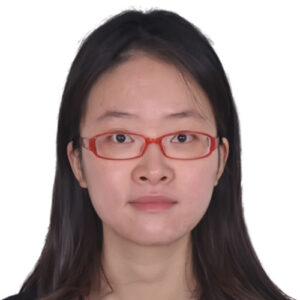
I am interested in long-distance mobile signals from roots to shoots in Arabidopsis. Besides re-engineering mobile signals, I am also interested in the mechanisms for mobile signals. Answering how and why signals move and communicate will help us understand plants’ reactions to different environmental conditions and further help to improve food productivity in the near future. CROPPS provides a friendly and collaborative space for researchers. I am excited to learn and share knowledge with other participants. I am also very happy to be in a well-funded project so that I can explore new things every day which really makes me happy and excited.
Research Themes: Integrative Team for Organismal Communication (iTOC)

In an increasingly arid world, it is imperative to understand how plants coordinate and regulate their water levels to cultivate resilient plant varieties that can thrive in future climates. Within the collaborative and inclusive environment of CROPPS, I have the opportunity to engage in interdisciplinary research, bringing together experts from diverse fields to explore innovative approaches to this problem. This collaborative setting enhances my research focus on unraveling the intricate dynamics of cotton’s water regulation under drought conditions. By employing advanced modeling techniques, I aim to shed light on the underlying mechanisms and genetic controls that enable plants to maintain their water balance effectively. Through these efforts, we can pave the way for developing plant varieties that possess enhanced resilience and sustainability in the face of evolving environmental challenges.
Research Theme: Discovery Engine for Extreme Phenotypes and Field Investigation of Novel Diversity (DEEPFIND)
The changing climate increases the magnitude and uncertainty of water stresses experienced by plants in agriculture and natural ecosystems. Existing frameworks for modeling plant responses to these stresses do not adequately account for the coupling of physical and biological processes and these deficiencies hinder the pursuit of genetic hypotheses and compromise the robustness of predictions. I am currently working on developing a systems biology framework of stomatal regulation that helps understand plant response to drought conditions. I aim to use the systems biology model to guide the design of new genetic variants with interesting phenotypes with respect to water and carbon dioxide regulation and to form the basis of mechanistic models within plant in-silico models.
Research Theme: Discovery Engine for Extreme Phenotypes and Field Investigation of Novel Diversity (DEEPFIND)
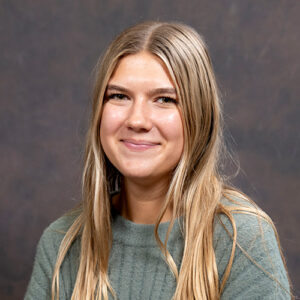
I work with tissue culture in Dr. Moose’s lab. We have been studying the RUBY gene in maize through particle bombardment. The RUBY gene expresses a red pigment in maize cells when DNA bombardment is successful. This is a new gene that makes it much easier to identify the specific cells that have been transformed. It is our hope that this gene could be used in the future to accelerate the plant transformation process, and provide a means of communication for plants to indicate when they are exposed to stress. In the lab, I focus on subculturing and selecting for successful plant transformants. Experimenting with different genes and how plants react to them allows us to think about broader applications. CROPPS has an incredible real-world application, and participating in this program makes me feel like I am making a significant impact. I hope not only to improve my skills in the lab, but also to open my mind to different and unique ways that agriculture can change and improve.
Research Themes: Integrative Team for Organismal Communication (iTOC), Discovery Engine for Extreme Phenotypes and Field Investigation of Novel Diversity (DEEPFIND)
Phenotyping and multi-scale modelling of phenotypic data are pressing challenges for understanding biological processes and leveraging that information for crop improvement. My project will merge the fields of computer science, engineering, biology, and data science to understand above and below-ground processes, with particular emphasis on integration of multi-scale remotely sensed phenotypic data and below-ground phenotyping. Currently, we are working to integrate ground rover and drone data, with the goal of improving predictions of important crop traits, such as yield. We are also interested in phenotyping below-ground processes, including examination of root exudate and soil organic carbon dynamics. I am excited to be a part of CROPPS to have the opportunity to work with faculty and students from across different disciplines and outside of my institution.
Research Theme: Discovery Engine for Extreme Phenotypes and Field Investigation of Novel Diversity (DEEPFIND)

I’m excited to be a part of CROPPS because it will allow me to collaborate with others and contribute to making farming cleaner and more sustainable without sacrificing efficiency.
A key problem with modern agriculture is that crop varieties grown today have been bred primarily for traits like enhanced yield. While these traits are important for productivity and for feeding a growing population, they have been selected for under high-nutrient conditions. This has inadvertently led to the development of crop varieties that struggle to optimize their growth under nutrient-depleted conditions. As a result, farmers are often required to apply excess fertilizer to ensure optimal growth, much of which is not utilized by the crops and escapes into the environment as various pollutants.
My work focuses on better understanding nitrogen use efficiency in plants and identifying solutions to improve current crop varieties, enabling them to thrive with less fertilizer application.

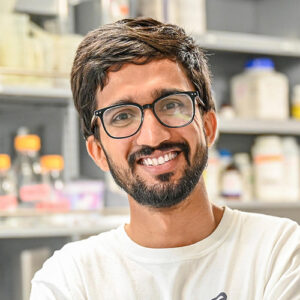
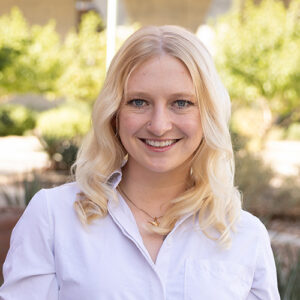
I’m a University of Arizona Ph.D. student with a deep passion for plants, sustainability, and diversity, equity, and inclusion (DEI), making CROPPS a perfect fit for me. Having completed my undergrad here, I have a profound connection to this institution. Beyond the lab, I cultivate an array of ornamental and edible plants, nurturing my love for green life. During my undergraduate years, I began studying CEPR1, a nitrogen-responsive receptor involved in long-distance signaling between plant roots and shoots. I’m thrilled to continue exploring these areas in the Beilstein lab’s evolutionary study of CEPR1, and I look forward to contributing to CROPPS.
Research Theme: Integrative Team for Organismal Communication (iTOC)
Agriculture impacts and connects us all, literally creating the global ‘dinner plate’. I have a passion to understand the natural world and am working to create a world where diversity is used to develop innovative solutions to keep that plate full. My doctoral research in Plant Science focuses on plant developmental biology.
Research Theme: Integrative Team for Organismal Communication (iTOC)
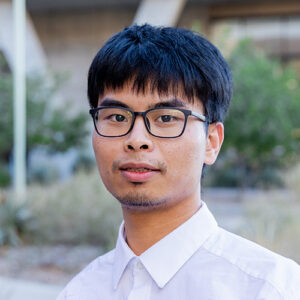

By education, I am a plant molecular biologist. CROPPS provides me with an opportunity to collaborate with groups from other fields, including mechanical engineering and biomolecular engineering. In CROPPS, I will explore different methods by which we can make key crops like maize, cotton, and tomato more resilient to drought and nutritional stress. In order to make this process more robust, we are adapting methods that are currently available for the transformation of these crops and innovating new things in these methods. We are working with the engineering team very closely and trying to automate the entire bioengineering process. This opportunity to work with people in the engineering field further opens a door for me to expand my thinking and work in a direction I had never imagined. Through CROPPS, I hope to contribute some good science and work to society.
Research Theme: Integrative Team for Organismal Communication (iTOC); Discovery Engine for Extreme Phenotypes and Field Investigation of Novel (DEEPFIND); Social and Ethical Engagement with Digital Biology (SEED); Plant Bioengineering Hub (PBH)
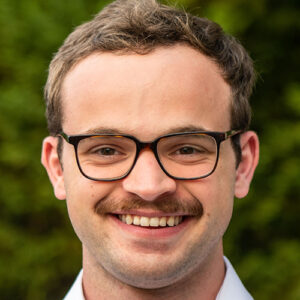


My work with CROPPS will focus on developing novel, inducible systems to direct the specific spaciotemporal control of reactive oxygen (ROS) production. ROS can damage the plant cell, but can also act as a stress signal to prompt a response by the plant. Changes in ROS are one way a plant can sense its environment. This sensing and signaling often involves energy producing organelles, such as the chloroplast and mitochondria. Better understanding these critical signaling systems will allow us to produce more stress-tolerant plants. They are also ideal mechanisms for “translating” the plants’ cellular communication into reporter signals that can be detected by cameras and other sensors, allowing scientists and farmers to “understand” what the plant is saying when it is stressed.
Research Theme: Integrative Team for Organismal Communication (iTOC)

Plants have been providing us with food, fuel, feed, and fiber for as long as we have been around, but humans are less adept at providing for the needs of plants. Wouldn’t it be great if they could just tell us what they need? I have always valued the collaborative and transdisciplinary nature of working with plants, and I am excited to be a part of CROPPS. My research interests lie in genetics and breeding. For CROPPS I will be phenotyping plants for nitrogen response traits in the field to gain a better understanding of how these traits relate to their underlying genetics. I believe that using technological innovations will be integral to helping breed resilient plants for a sustainable future, and through CROPPS I hope to learn how best to apply these new technologies.
Research Theme: Discovery Engine for Extreme Phenotypes and Field Investigation of Novel Diversity (DEEPFIND)
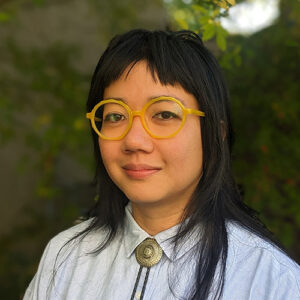
Research Theme: Social and Ethical Engagement with Digital Biology (SEED)
My research focuses on the development of robotics systems that mimic, are inspired by, or interact with organic elements. My vision is to develop a feedback loop that gains inspiration from evolutional designs and refines robotic systems to be compatible and comparable to natural systems.
Research Theme: Integrative Team for Organismal Communication (iTOC); Innovating Methods for Plant Communication Technology (IMPACT)
I am a multidisciplinary researcher working in the Organic Robotics Lab under Prof. Shepherd. I work on bio-inspired soft robotics and biohybrid systems (especially worms, plants, fungi). I am interested in developing biohybrid/engineer living systems for agricultural sensing technologies. CROPPS is a unique platform with highly multidisciplinary researchers which provides the opportunity to collaborate, generate new ideas and propel high-risk ideas into reality. At CROPPS, I will work on two projects. In the first project, I am developing a worm-like soft digging robot and a multisensory fused soft gripper that will connect with plants under and above the ground (roots and leaves) and measure high throughput data like water potential, and CO2 concentration, temperature, and humidity in-situ. In the second project, I am developing a biohybrid sensor with mycelium network for soil health sensing. These proposed projects are long-term and high risk, but the CROPPS community will provide the resources to make it possible. Through CROPPS, I can create a network of researchers and develop transdisciplinary skills, uniting synthetic biology, genetics, fundamentals of plant science and engineering. I also hope to develop mentorship, professional leadership, and networking skills through CROPPS’s outreach and DEI programs.
Research Theme: Field Endophenotyping
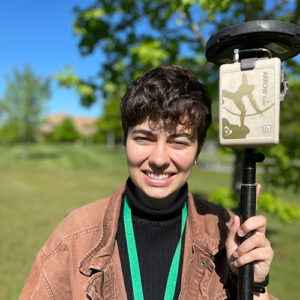


As a PhD student in Plant Biology and a member of a Chemical Engineering lab, my research interests include efforts to understand communication and symbiosis between plants and other species through biosensors designed to detect and respond to interspecies chemical signaling. I am excited to be a part of the CROPPS mission to use scientific tools to form a dialogue between humans and plants and help make plants, which are so important to humankind, more resilient in the face of climate change and disease.
Research Theme: Discovery Engine for Extreme Phenotypes and Field Investigation of Novel Diversity (DEEPFIND)



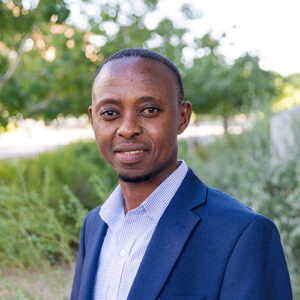
Maize production is water-intensive, and in a changing climate, water conservation will play a key role in preserving existing yield potential. Stomata are the pores through which carbon dioxide enters the leaf while water exits via transpiration; as such, stomata play a crucial role in maximizing the amount of carbon dioxide gained per unit of water lost, a trait known as water-use efficiency. Stomata open and close in response to multiple environmental stimuli. To improve plant water-use efficiency, my work focuses on controlling the response rate for stomatal opening and closure by leveraging both endogenous and engineered molecular approaches. Specifically, I investigate how altering the expression of membrane channel proteins called aquaporins, which facilitate the diffusion of water and other small solutes like carbon dioxide, can be optimized for maize production. I also explore how regulating downstream components of the stomatal signaling pathway can be enhanced for improved plant water-use efficiency, with the goal of advancing such traits into viable germplasm for maize breeding programs. The research partnerships facilitated by CROPPS will enable a more comprehensive approach to investigations of these attributes, with the ultimate goal of developing novel genetic circuits to augment native water-use efficiency.
Research Theme: Discovery Engine for Extreme Phenotypes and Field Investigation of Novel Diversity (DEEPFIND)

I am passionate about plants and I have a collection of indoor plants. However, I often end up unintentionally damaging them by watering too much or exposing them to too much light. I wondered if there might be a way to communicate with plants, or for them to communicate with us.
I was thrilled when I first learned about CROPPS and their research on programmable plants. I joined the Moose lab at UIUC. Currently, I’m working on developing a biosensor that can visually indicate the nitrogen status of corn plants—something that has previously been invisible to the naked eye. Such biosensors could be valuable research tools for understanding how plants acquire and utilize nutrients, while helping growers monitor the nutrient status of their crops throughout the season. Our project will involve creating a series of transgenic corn using CRISPR/Cas9-mediated leaf transformation, which I’m eager to learn more about. The nitrogen status will be displayed through the expression of the RUBY reporter gene, which converts tyrosine to produce the red pigment betalain in the plant.
I am a Ph.D. student at Cornell University, studying the gamble for life in a plant, defined as the compromise that plants manage by maximising the rate of carbon dioxide assimilation from the atmosphere while minimising water loss and avoiding subsequent desiccation. This gas exchange process, central to life on earth, is a compromise in plants since the transport of both water vapor and carbon dioxide occur through the same pores, called stomates, on the leaf surface. We are discovering the mechanisms by which plants could break this compromise so that one can engineer plants that produce more food while consuming less water in agriculture. To this end, I study the regulation of coupled-water-carbon transport in leaves using existing and emerging technologies. I hope my engagement with CROPPS allows me to gain a deeper appreciation of the mysteries in plant biology and to forge long-lasting connections with fellow CROPPS researchers.
Research Theme: Integrative Team for Organismal Communication (iTOC); Discovery Engine for Extreme Phenotypes and Field Investigation of Novel Diversity (DEEPFIND)
I am excited to participate in CROPPS as it will prepare me for a career in plant biotechnology research. My research project is to design and implement optogenetic switches that can be used to finetune gene expression in multiple species of plants, including agronomically important crops. By advancing the field of synthetic plant biology to develop transducers manipulated by next-generation technologies, this work aligns with the “programmable plants” theme within CROPPS. The large-scale goal is to understand deep plant biology and improve abiotic stress tolerance.
Research Theme: Integrative Team for Organismal Communication (iTOC)
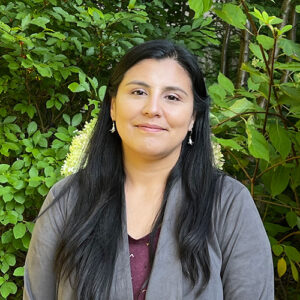
I am an agricultural engineer working on aboveground morpho-physiological traits that allow crops to resist abiotic stress with focus in water deficit. Part of my research was conducted includes topics as genotype by environment interaction, trait plasticity, and water use efficiency assessed through stable isotopes.
I am excited to participate in CROPPS to answer novel questions about plant responses to drought using a whole-plant perspective in which above- and below-ground components communicate and coordinate a response to stressors. Answering these questions will give me the opportunity to develop and contribute to the understanding and communication with plants.
Research Theme: Discovery Engine for Extreme Phenotypes and Field Investigation of Novel Diversity (DEEPFIND)

My main area of research is Computer Architecture. I am interested in accelerating workloads that are in the critical path of CROPPS projects and related areas, particularly in plant genomics. For example, successful CRISPR-Cas9 experiments can take years to complete, and failed mutations uncovered too late in the process result in significant delays. Seasonality of crops increases the possible delays. If we can accelerate genome editing toolflows, we can be one step closer to one of CROPPS’ main goals: Feeding the world.
Research Theme: Plant Bioengineering Hub (PBH)

Through years of selective breeding, we’ve chosen crops for consistency and yield, but that has left them vulnerable to the environmental stress anticipated as global climate patterns change. We want to understand more about how plants react to environmental signals and how they turn genes on and off to take in and process nutrients accordingly. I study nitrogen use and metabolism in maize by finding patterns in gene expression and building networks of genes that regulate other genes so that we can understand how genetics impact plant traits. With CROPPS diverse network of scientists and researchers, I can integrate all sorts of data to build a more robust model of gene regulation and metabolism that will be the most informative for people with a wide spectrum of scientific knowledge.
Research Theme: Discovery Engine for Extreme Phenotypes and Field Investigation of Novel Diversity (DEEPFIND)
Water limitations already adversely affect crop production and will become a greater problem over the next several decades due to global climate change. Improvements in water-use efficiency would enable crops to better withstand both short-term and long-term droughts. My research seeks to improve water-use in maize while still maintaining productivity. Currently, our lab group uses genetic and physiological approaches to identify the regulators of various leaf traits that influence transpirational water loss. With our findings, we can engineer maize varieties that use available water more efficiently to improve their resiliency during climate change. Within CROPPS, our research will improve communication between plants and the grower as a method to improve management practices.
Research Theme: Discovery Engine for Extreme Phenotypes and Field Investigation of Novel Genetics (DEEPFIND)
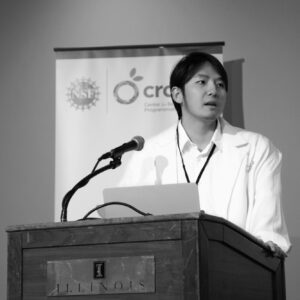
With strong interests in artificial intelligence, stochastic dynamical systems, and environmental biotechnology, I participated in CROPPS because of its broad research collaboration and inclusive environment. The study of single-cell high-resolution correlation of unculturable microbial phenotypes and genotypes in complex plant rhizosphere requires interdisciplinary knowledge and tools. In CROPPS, I plan to develop a fundamental single-cell biotechnology platform integrated with advanced data analytics and theoretical dynamic models for the study of programmable plant systems.
Research Theme: Integrative Team for Organismal Communication (iTOC)
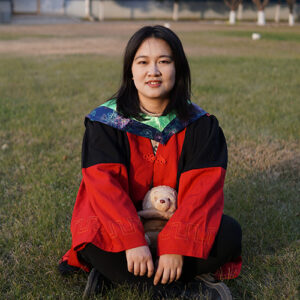
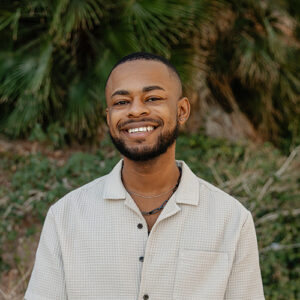
I am interested in CROPPS because of its mission to develop groundbreaking tools to listen and talk to plants. Plants are wired with internal long-distance communication systems that enable roots and shoots to adapt growth to fluctuating environments; long-distance signals are signaling molecules (peptides in my project) that translocate from one organ system/tissue to another within plants. The C-terminally encoded peptide (CEP) signaling relay is one such system. Under limited Nitrogen conditions, plants produce CEP peptides in their roots that travel up into the shoot where they bind to two CEP receptors (CEPRs). These receptors turn on the production of shoot-derived polypeptides–CEP Downstream 1/2 (CEPD1/2)–that descend back down into the roots and increase Nitrogen uptake. I plan to engineer a novel synthetic system in tomato that is constructed around the core components involved in CEP nitrogen signaling. My project’s aim is to create biotic drought-sensor plants that produce a fluorescent signal in response to water replete environments. CROPPS opens a stage for collaboration that I hope will allow me to lessen the gap between applied plant biology/agricultural studies and digital studies.
Research Theme: Integrative Team for Organismal Communication (iTOC)
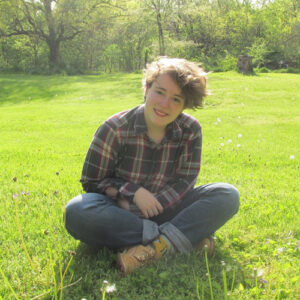
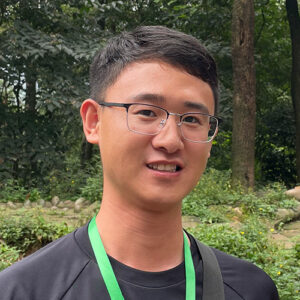

CROPPS Alumni
Computer networks that connect sensors, computers, robots, UAVs, and other equipment into a cohesive whole are a key component in enabling digital agriculture. As a researcher of computer networks, I aim to make these networks more effective, efficient, and practical. By participating in CROPPS, I hope to better understand which networking challenges must be solved to enable digital agriculture.
Research Theme: Innovating Methods for Plant Communication Technology (IMPACT)

My research focuses on developing autonomy algorithms for mobile robots that operate in harsh, changing, and uncertain environments. I am interested to participate in CROPPS because it is a great opportunity to integrate my research with other areas in order to increase the impact of robotic applications in agriculture. Using our TerraSentia under-canopy robotic platform, I will collect established under-canopy plant-phenotypic traits. I will compare this data-collection method with other methods and build a multi-modal dataset. This high-quality, verified data, collected autonomously and at high-throughput, will facilitate several crop-science advances. I will also modify our robots to accommodate new sensing modalities for CROPSS objectives in order to make communication with plants more intensive and accurate.
Research Theme: Discovery Engine for Extreme Phenotypes and Field Investigation of Novel Diversity (DEEPFIND); Integrative Team for Organismal Communication (iTOC)

My research involves using tools from the acoustics domain to solve problems in localization and source enhancement. My goal is to develop novel algorithms involving acoustic sensors to track field robots and to remotely sense the physical characteristics of soil.
Research Theme: Discovery Engine for Extreme Phenotypes and Field Investigation of Novel Diversity (DEEPFIND)
I am transitioning from undergraduate to graduate work at Cornell, and my participation in CROPPS offers a system of support and an incredible opportunity to meet scientists in my field and related fields. My research focuses on identifying transcripts within the mRNA mobileome (mobile mRNAs that travel through the phloem root-to-shoot and shoot-to-root) that may be acting as signals. We use heterografted tomato and eggplant (tomato scions on eggplant rootstocks and vice versa) to help us identify which transcripts are moving across the graft junction. This will increase our understanding of intra-plant communication. Thus far we have focused on the mRNA movement in young, grafted seedlings over diurnal time, by flash freezing samples at regular intervals across a 48-hour period. As I transition into graduate school, I will expand this ongoing research to small RNAs as well as mRNA.
Research Theme: Integrative Team for Organismal Communication (iTOC)
CROPPS provides opportunities for researchers to interact, encouraging new perspectives and lines of thought. This provides a wonderful opportunity for me to meet, collaborate with, and gain insight from scientists with experience in many different fields. My project studies the evolution of cell signaling mechanisms involved in barriers to reproduction. Understanding these existing barriers might allow us to use them to program which plants would be able to reproduce. Through CROPPS, I also hope to learn about the thought process and collaborative work methods of plant engineering and modification.
Research Themes: Integrative Team for Organismal Communication (iTOC)
I am a doctoral student studying RNA-directed DNA methylation (RdDM). My projects include fluorescence in-situ hybridization in Brassica rapa seeds and ovules and tissue-specific complementation of RDR2 (an important protein in RdDM) in plants that inherently lack this protein. Fluorescence in situ hybridization (FISH) allows us to detect the small RNAs that direct methylation in plants by placing a fluorescent tag on sequence-specific RNA molecules. Through the use of microscopy, we can physically see where these molecules are within the plant. For CROPPS, I hope to learn more about how these small RNAs are involved in plant systems and how we might be able to influence these pathways to communicate with plants at a cellular or subcellular level.
Research Theme: Integrative Team for Organismal Communication (iTOC)

I work in Joyce Van Eck’s lab on developing more robust bioengineering methods for important crop species. Coming from a background in evolutionary developmental biology, I’m thrilled to find much of the knowledge in this field having translational value and direct application in plant biotechnology and agriculture.
Research Theme: Plant Bioengineering Hub (PBH)

I am a postdoctoral research scholar in Professor Christopher Alabi’s laboratory in Cornell University. I am really excited and consider myself fortunate to be part of CROPPS. I am currently working with Cellulose Nano Crystals (CNCs) to develop an effective noninvasive and biocompatible methodology for delivering genetic materials into plant cells. As a chemist I am given the task of designing the strategies of surface modifications of CNCs chemically, so that they can be amenable to serve as suitable carriers of genetic materials into plant cell cytoplasm and other targeted intracellular regions.
Research Theme: Social and Ethical Engagement with Digital Biology (SEED)
My background is in microbial ecology and my work with CROPPS will feature in situ soil microbiome phenotyping using GHz ultrasonic microscopy. CROPPS provides me the opportunity to undertake interdisciplinary work that uses cutting edge technologies and provides collaboration with researchers from other departments and schools. This opportunity to be exposed to other fields will help me think from different perspectives.
Research Theme: Discovery Engine for Extreme Phenotypes and Field Investigation of Novel Diversity (DEEPFIND)
I am a junior at the University of Arizona studying Political Science. I am very passionate about environmental justice and sustainability and am looking forward to examining diverse opinions about digital biology. I truly believe that studying public opinion is one of the first steps to saving our planet. CROPPS is a great match for me because it will allow me to combine my background in social studies with my passion for sustainability. I feel very fortunate to be a part of such important work and I am looking forward to assisting Samara Klar this summer!
Research Theme: Social and Ethical Engagement in Digital Biology (SEED)
My project will focus on correlating plant phenotype to the underground microbial community. We are specifically interested in discovering which microbes are involved in denitrification and utilizing that information to reduce nitrous oxide emissions from agricultural fields. By collecting phenotypic data above and below the soil, we can correlate which genotypes most effectively influence denitrification in the microbial community. The goal is to develop plants that influence the microbial community to limit greenhouse gas emissions from the soil. I am interested in CROPPS because it allows me to work across disciplines–in microbial genetics and soil science–and connect with faculty outside of my department and university. This large network of CROPPS mentors and training is unique to the program.
Research Theme: Discovery Engine for Extreme Phenotypes and Field Investigation of Novel Diversity (DEEPFIND)
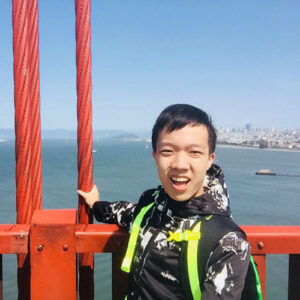
Agricultural scientists today are acutely aware of public concerns around their work, which range from questions about human and environmental safety to corporatization of the food supply. Alongside development of new generations of technologies, many scientists find themselves navigating various biological and social boundaries with the goal of cultivating support for their work through different, innovative means. My research seeks to understand how academic scientists adapt their work with controversial technologies to meet multiple scientific and public goals. My dissertation work on genetic engineering shows that when provided with the opportunity, many scientists are willing, and indeed motivated, to reflect on their roles, responsibilities, visions, and the meanings of their work. Rather than providing after-the-fact analysis, a primary objective of my work is to continue developing and implementing a model of embedded social science research that encourages scientists to think critically about ethical impacts of their work in real-time. CROPPS provides me with a particularly unique space to both continue this contribution to academic social science research as well as implement it in practice with a community of scientists embarking on this new initiative around digital biology. I plan to continue this work as my post-doctoral research, as well.
Research Theme: Social and Ethical Engagement in Digital Biology (SEED)
My research interest focuses on phosphorus (P) cycling in cropland and how plants can benefit from rhizosphere and microbial P interactions. A group of bacteria called Polyphosphate-accumulating organisms (PAOs) has particularly attracted my attention because of their ability to reserve and deliver P in agriculture. Their occurrence and involvement in cropland could be of great assistance in mediating the global P shortage. The agricultural significance of PAOs is that they are a critical piece in elucidating biochemical communication in belowground plant environments, a primary goal of CROPPS.
Research Theme: Integrative Team for Organismal Communication (iTOC)
I am a doctoral candidate in Theoretical and Applied Mechanics studying under Robert Shepherd. Previously, I studied design principles for high-density soft actuation arrays. I am using soft robotics actuation and sensing methods to help our CROPPS team increase the speed and reliability of plant tissue culture and transformation, currently done by hand. With automation, we hope to eliminate researcher strain and injury, shorten experimental iterations, and lead to higher quality data and results.
Research Theme: Discovery Engine for Extreme Phenotypes and Field Investigation of Novel Diversity (DEEPFIND); Innovating Methods for Plant Communication Technology (IMPACT)
Resistance to water flow across roots and their surrounding soil (rhizosphere) affects water movement in the soil-plant-atmosphere continuum (SPAC) and is pivotal for plant productivity under varying environmental conditions. Commercially available tools for the measurement of soil hydraulics are restricted in their spatial resolution and thus cannot resolve local properties and processes in the rhizosphere. In my cross-disciplinary research, I work on the development of tools probing soil, rhizosphere, and leaf-plant water relations that will lay the foundation of a holistic understanding of water flow in the SPAC.
Research Theme: Integrative Team for Organismal Communication (iTOC)
Research Themes: Discovery Engine for Extreme Phenotypes and Field Investigation of Novel Diversity (DEEPFIND)
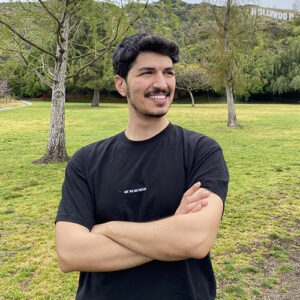
As a Predoctoral Fellow in Dr. Varshney’s lab conducting research at the intersection of visual arts, creativity, and AI, my interest in CROPPS stems from my curiosity for engaging biology with my current practice. So far this has led to a children’s book, inspired by the language of plant communication, titled Young McDonald Had a Botanical Farm. Throughout my involvement in CROPPS, I hope to learn more about plant research and create inspirational connections between disciplines that will fuel fascinating research while fulfilling my personal desire to embark on farming one day.
Research Theme: Integrative Team for Organismal Communication (iTOC)

My research seeks to uncover mechanisms that govern plant stress physiology, elucidate molecular bases for stress responses, and inform models of leaf gas exchange processes that play a critical role in predictions of dynamics from individual plants to the global climate. From a professional standpoint, it is very exciting to participate in CROPPS. The rich collaboration between labs with expertise in engineering and in biology can make important endophenotypes accessible across diverse genetics and environments. The diversity of backgrounds of participants in CROPPS will personally challenge me to develop my communication and presentation skills so I can engage a broader audience.
Research Theme: Discovery Engine for Extreme Phenotypes and Field Investigation of Novel Diversity (DEEPFIND)
I am a doctoral student studying intercellular connectivity, plant development, and specialized metabolism. My main thesis project concerns the biology of plant latex, a milky suspension full of specialized chemicals that helps plants defend against threats such as insect herbivores. I am curious about how plants produce the network of cells that hold latex. My participation in CROPPS will involve testing whether RNA molecules labelled with “click chemistry” technology can be fed to tomato seedlings and tracked using microscopy. This would enable us to observe RNA movement across tomato graft junctions in order to test how plants are able to heal after grafting, and could be used in other applications as well. As a trainee, I am hoping to benefit from mentorship from and collaboration with other CROPPS participants.
Research Theme: Integrative Team for Organismal Communication (iTOC)
Growing up on a farm in rural Missouri instilled in me an appreciation for the interface between our agricultural and ecological spaces. I saw first-hand how inefficiencies in cropping systems can have negative impacts on the wider surrounding environment. My appreciation for our wild spaces led me to develop skills and technologies to help reduce this agricultural impact on ecosystems. I study how plant viruses interact with plant cells to reprogram the cellular environment for virus replication. I am working to design molecular circuits that can report on this virus-plant communication by ‘eavesdropping’ on these conversations. My research goals are to help provide a rapid detection reporter in cropping systems, to provide researchers with fine-tuned molecular tools to explore virus interactions with plant cells, and to develop molecular switches which could expand our toolbox for designing plants that are resistant to viral pathogens.
Research Theme: Innovating Methods for Plant Communication Technology (IMPACT); Integrative Team for Organismal Communication (iTOC)
I’m a microbiologist using a whole-community approach to study the feedback loops between plant root microbial communities (i.e. the root microbiome) and the soil microbial communities. Plants can recruit microbes from the soil by providing carbon resources (i.e. food); this allows plants and microbes to form important associations that are vital for healthy plant functioning. Plants and microbes communicate with each other, and this communication can be dependent on the plant health status or whether the plant is under environmental stress. Broadly, my research focuses on how we can manipulate this plant-microbe communication to help the plant recruit the microbes that will help it the most under periods of drought stress. More specifically, I build synthetic communities and manipulate soil microbial pools to alter plant recruitment patterns in order to determine which microbes directly help the plant and how we can decipher the cross-talk between them. CROPPS sets out to understand the language of plants: essentially it asks what signals can we use to sense the needs of the plant and how can we manipulate these signals to improve the long-term sustainability of agriculture? My research will identify how below ground signaling can impact above ground (i.e. plant health and yield) responses.
Research Theme: Integrative Team for Organismal Communication (iTOC)

I am postdoctoral associate in Organic Robotic Lab at Cornell University. As part of CROPPS, my primary focus lies in the development of a sophisticated robot for underground exploration. My specific research involves real-time data collection to effectively map the spatiotemporal distribution of critical factors in soils such as humidity, temperature, and soil gases. With our robot, we are expecting to gather an unprecedented amount of data simultaneously, which will lead to a deeper understanding of the underground world. I am proud to be a part of this project and excited about the possibilities that it holds. I believe that our work will have a significant impact on the way we interact with the underground world
Research Theme: Innovating Methods for Plant Communication Technology (IMPACT)
I am interested in CROPPS because it will provide me with opportunities to interact with people interested in plant research from different universities. The lab that I work in as an undergraduate research assistant seeks to understand the evolutionary histories of plants, specifically in the Brassicaceae family, in order to gain insight into the cell signaling processes involved in reproductive compatibility. During my time with CROPPS, I hope collaborating with many researchers and exploring other projects will broaden my understanding of plant communication.
Research Theme: Integrative Team for Organismal Communication (iTOC)
My research involves soft robotics design, modeling, and control, emphasizing the deployment of robots to perform plant manipulation tasks autonomously. To achieve CROPPS objectives, the robots (soft and rigid) will be modified to accommodate new sensing modalities. Autonomous field robots will play a crucial role to permit versatile, precise, and high-throughput plant programming.
Research Theme: Innovating Methods for Plant Communication Technology (IMPACT)
My research focuses on the interaction of enzyme proteins in plants. Plant proteins are organized to form protein complexes, which help to accomplish complex biochemical and physiological actions. I am interested in using the tools of synthetic biology to explore the intrinsic inter-relationships of these plant proteins, especially plant enzymes. In the future, I want to explain the details of plant-environment communication and apply the mysterious protein-protein interaction in microbial cell factories to improving plant resilience.
Research Theme: Integrative Team for Organismal Communication (iTOC)

Owing to population growth and meeting food demands sustainably with the labor shortage, there is rising interest in automated solutions for various agricultural tasks in recent years. Unlike large-scale equipment like tractors or harvesters, attending to individual perennial plants or even a large variety of plants requires a small-scale solution using robot manipulators. Therefore through CROPPS, I intend to develop a robust, high-throughput manipulator system catering to tasks like phenotyping, pruning, and harvesting berry-like plants. While developing hardware is crucial, another vital component is an algorithmic investigation on how to approach targets of interest like stems, leaves, and fruits without damaging the plant. Through this research, not only are the farming tasks like harvesting and pruning done autonomously but also assist in the human-intensive task of phenotyping.
Research Theme: Field Endophenotyping
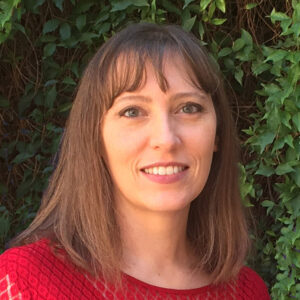
My fundamental scientific interest is in heritability and its limits. The DNA we inherit from our parents makes us similar to them, but the environment we live in can modulate our genes to make us different from our parents. How does this happen? The passage of information from one generation to the next is one of the fundamental rules of life, applicable to plants as well as to people. I am excited by what CROPPS will discover about how information flows to, from, and within plant systems.
I am also passionate about providing opportunities for high school and undergraduate students to participate in laboratory research. My start in science began when I was 15 years old, working as a high school student in a University of Arizona lab. I had a simple project–searching for mutants of Arabidopsis with increased sensitivity to U/V light–but by being immersed in a working laboratory I learned much more about genetics and molecular biology. I explored several different experimental systems throughout my high school and undergraduate years – from mammalian toxicology to fish ecology – but I always came back to plant genetics. That early opportunity to work in a research lab quite literally set the trajectory for my professional life. I hope that the various research internships CROPPS will sponsor will likewise inspire a new generation of scientists and engineers to focus on plant sciences.
Research theme: Plant Programming
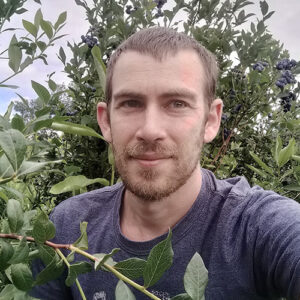

Research Theme: Plant Bioengineering Hub (PBH)
I am an evolutionary plant biologist interested in changes that happen in plant species over time, whether by natural selection or selection by humans. Previously, I studied the domestication history of the cultivated tomato using genomic tools. My current research has two main foci: 1) understanding the domestication history of the cultivated eggplant; 2) understanding the molecular mechanisms involved in graft compatability between eggplant and tomato.
Research Theme: Integrative Team for Organismal Communication (iTOC)
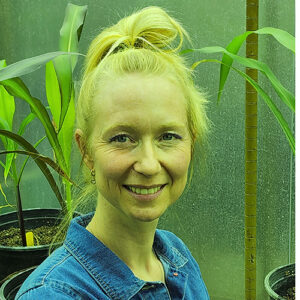
Research Themes: Integrative Team for Organismal Communication (iTOC) and Discovery Engine for Extreme Phenotypes and Field Investigation of Novel Diversity (DEEPFIND)
My research project focuses on understanding the development of corn kernels, especially when plants are stressed and do not complete kernel development. This often occurs because the plants do not receive enough nitrogen fertilizer, but by the time the stress is visible, it is typically too late to rescue the plants. I am excited to participate in CROPPS to help develop mechanisms by which plants can inform farmers and researchers of stresses before it is too late. I am also excited to show non-scientists the ways that plants can respond and communicate about these stresses.
Research Theme: Discovery Engine for Extreme Phenotypes and Field Investigation of Novel Diversity (DEEPFIND)
Rural infrastructure tends to be less robust, more likely to break down, and less likely to be repaired than urban infrastructure. My research tries to anticipate this fragility in emerging rural networking infrastructure that supports digital agriculture (DA). DA uses data-driven techniques to optimize farm efficiency. My approach comes out of critical technical practice, which unifies hands-on system building with critical reflection on the likely societal outcomes of the system design and implementation decisions. By unifying experimental networking research with critical reflection, I hope to develop more extensible, reconfigurable, and fault-tolerant networked systems compared to conventional methods.
Research Theme: Social and Ethical Engagement with Digital Biology (SEED)
As part of CROPPS I hope to improve live imaging in plants by using a revolutionary new technology known as multiphoton hyperspectral microscopy. Traditional microscopy techniques allow us to visualize and track 2-4 biosensors at a time, but with this new microscopy method scientists have been able to track up to seven biosensors simultaneously. Theoretically, even more than seven biosensors could be simultaneously tracked. Tracking more biosensors means being able to see more dynamic changes and environmental responses in real time in the plant. This literally allows us to see how signals move and interact within the plant as it senses and adapts to its environment.
Research Theme: Integrative Team for Organismal Communication (iTOC)
I hope to improve my professional skills and learn from the experiences of diverse teams of different institutes as part of the cross-institute research collaboration of CROPPS. Our project focuses on understanding the molecular basis of communication among plants’ root and shoot systems at the transcriptomic level. It requires very specialized set of expertise from experimental to computational scale and the diverse groups of experts in CROPPS are the right place to untangle these complex labyrinths of molecular interactions.
Research Theme: Integrative Team for Organismal Communication (iTOC)

I’m a doctoral student in Mechanical Engineering and my research interests include CMOS integrated high frequency ultrasonic devices and MEMS/NEMS sensors. I’m excited to participate in CROPPS as it allows me an opportunity to create technologies that has potential for large scale positive impact. Intercepting and understanding gaseous exudates / volatile organic compounds from plants has been an integral technique towards iTOC’s mission to understand plant communication in the language they use to sense and respond to living and physical environments. My project titled “Characterization of microbiome by soil gas emissions using miniature chip-scale ion-mobility based gas sensors” aims to miniaturize a differential ion mobility based FAIMS gas sensor that would serve as a low cost, mass scalable technology for on-field VOC detection, which would in turn help understand plant communication and interaction with environmental stimulus.
Research Theme: Integrative Team for Organismal Communication (iTOC)

I am excited to join CROPPS to ask novel questions about how root exudates manipulate rhizosphere multi-domain interactions and how to effectively phenotype the root exudates so that we can ultimately breed for specific rhizosphere interactions. My project focuses on using spectroscopic techniques to non-lethally characterize root exudates in the rhizosphere and in-real time. These projects are being conducted across 11 different maize inbred lines to provide exudate phenotypes. With this project I hope to elucidate exudate phenotypes, so that breeding for specific root exudation traits becomes an effective means in increasing stress tolerance, most especially drought tolerance.
Research Theme: Discovery Engine for Extreme Phenotypes and Field Investigation of Novel Diversity (DEEPFIND)
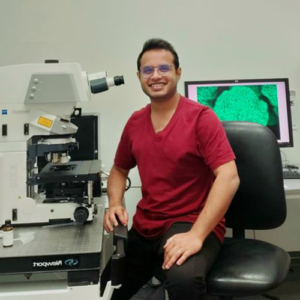
Presently a postdoctoral research associate with Dr. Adrienne Roeder, I am curious to know how plants sense organ size. My hypothesis is that at the molecular level, the organs use miRNA concentration gradients to sense their overall architecture and relay this information back to the constituent cells to regulate their growth behavior. Literary evidence suggests that miRNA319 promotes cell division whereas miR396 promotes cell differentiation and establishes opposing gradients in leaves, although their exact dynamics in a growing tissue is not well understood. I aim to track their biogenesis and activity in real-time using florescent protein based reporters.
Research Theme: Integrative Team for Organismal Communication (iTOC)
I am currently working on the evolution of pollen incompatibility within sister plant species. My hope is to engineer plants with specific reproductive compatibilities by using what nature has already designed to reimplement organic reproductive barriers. CROPP’s collaborations would facilitate this research while also letting me improve my networking and science communication skills; providing opportunities for me to learn how to ask critical scientific questions, and the ability to lead others in scientific discussions.
Research Theme: Innovating Methods for Plant Communication Technology (IMPACT)
I am a plant scientist using novel technologies such as proteomics and metabolomics to study plant rhizosphere metabolome in order to understand the soil carbon usage and sequestration into plants. This knowledge can be used to develop plant-based biosensors that estimate soil carbon and its uptake into plants. CROPPS’ integration of scientific excellence among different fields of biology, biochemistry, electronics, and environmental chemistry facilitates this research. I hope to understand how plants communicate with soil rhizosphere and vice versa; that understanding will come from my own experimental planning and through ongoing discourse with eminent CROPPS scholars and students.
Research Theme: Integrative Team for Organismal Communication (iTOC)
As well as providing greenhouse assistance as needed in the Moose Lab at the University of Illinois at Urbana-Champaign I also work on a CAPS genotyping assay with one of our graduate students for the purpose of determining which of our maize plants are carriers of different nitrate transport mutants. This genotyping assay guides our selection of plants for breeding advancement in our program. I also work on day-to-day lab activities related to genetic transformation in Sorghum and Maize.
Research Theme: Discovery Engine for Extreme Phenotypes and Field Investigation of Novel Diversity (DEEPFIND)
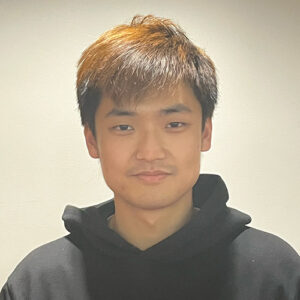
It’s great to join CROPPS to learn from and cooperate with experts from different fields such as plant science, chemical engineering, and biomedical engineering. In prior research, I worked on metabolite biosensor engineering to improve microbial cell factories. With CROPPS, I am interested in expanding the applications of these biosensors to study, simulate, or engineer plant communications.
Research Theme: Integrative Team for Organismal Communication (iTOC); Discovery Engine for Extreme Phenotypes and Field Investigation of Novel Diversity (DEEPFIND)
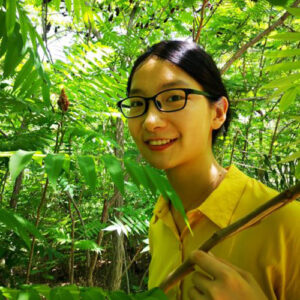
Research Theme: Discovery Engine for Extreme Phenotypes and Field Investigation of Novel Diversity (DEEPFIND)
To keep pace with increasing global caloric demand while simultaneously reducing agricultural greenhouse gas emissions, we need a second green revolution. A key component of this revolution will be maximizing plant nutrient utilization efficiency and the nutrient foraging ability of roots. To better understand how plant roots sense and increase the uptake of essential nutrients in the soil, I am studying the action of a small signaling peptide (CEP1) in corn and sorghum. CEP1 is a part of a nitrogen sensing root to shoot circuit that we will use to generate in plant biosensors that quickly and accurately report the nitrogen status of the plant and local soil conditions. Reprogramming the nitrogen sensing and uptake pathways will allow an unprecedented connection between plant growth and agricultural management. Additionally, the characterization of conserved signaling pathways are a key component of establishing two-way communication with plants, a key mission for CROPPS.
Research Theme: Discovery Engine for Extreme Phenotypes and Field Investigation of Novel Diversity (DEEPFIND); Integrative Team for Organismal Communication (iTOC)
CROPPS Science and Industry Advisory Board

Robyn Allscheid

Andy Anderson

Ranveer Chandra
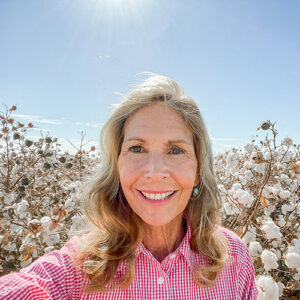
Karen Geldmacher

Don Jones

Charlie Messina

Rod Kumimoto

Eli Rodgers-Melnick

Jeffrey Staub

Nate Storey
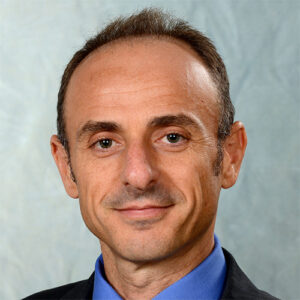
Slobodan Trifunovic
CROPPS External Advisory Board

Tina Brower-Thomas

Levon Esters

Ken Keegstra

Elliot Meyerowitz

Babak Parviz

Anne Sylvester




